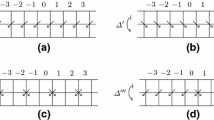Abstract
We introduce the classes of color blind and typhlotic cellular automata, that is, cellular automata that commute with all symbol permutations and all symbol mappings, respectively. We show that color blind cellular automata form a relatively large subclass of all cellular automata which contains an intrinsically universal automaton. On the other hand, we give simple characterizations for the color blind CA which are also group homomorphisms, and for general typhlotic CA, showing that both must be trivial in most cases.
Research supported by the Academy of Finland Grant 131558.
Access this chapter
Tax calculation will be finalised at checkout
Purchases are for personal use only
Preview
Unable to display preview. Download preview PDF.
Similar content being viewed by others
References
Boyle, M., Lind, D., Rudolph, D.: The automorphism group of a shift of finite type. Transactions of the American Mathematical Society 306(1), 71–114 (1988)
Coven, E.M., Hedlund, G.A., Rhodes, F.: The commuting block maps problem. Trans. Amer. Math. Soc. 249(1), 113–138 (1979)
Fukś, H.: Dynamics of the cellular automaton Rule 142. Complex Systems 16(2), 123–138 (2005)
Hedlund, G.A.: Endomorphisms and automorphisms of the shift dynamical system. Math. Systems Theory 3, 320–375 (1969)
Leinster, T.: Codensity and the ultrafilter monad. ArXiv e-prints (September 2012)
Martin, O., Odlyzko, A.M., Wolfram, S.: Algebraic properties of cellular automata. Comm. Math. Phys. 93(2), 219–258 (1984)
Miller, N.R., Bardzell, M.J.: The evolution homomorphism and permutation actions on group generated cellular automata. Complex Systems 15(2), 121–136 (2004)
Moore, C., Boykett, T.: Commuting cellular automata. Complex Systems 11(1), 55–64 (1997)
Ollinger, N.: Intrinsically universal cellular automata. In: Neary, T., Woods, D., Seda, A.K., Murphy, N. (eds.) CSP. EPTCS, vol. 1, pp. 199–204 (2008)
Salo, V., Törmä, I.: Geometry and Dynamics of the Besicovitch and Weyl Spaces. ArXiv e-prints (April 2012)
Theyssier, G.: How common can be universality for cellular automata? In: Diekert, V., Durand, B. (eds.) STACS 2005. LNCS, vol. 3404, pp. 121–132. Springer, Heidelberg (2005)
Wolfram, S.: Statistical mechanics of cellular automata. Rev. Modern Phys. 55(3), 601–644 (1983)
Author information
Authors and Affiliations
Editor information
Editors and Affiliations
Rights and permissions
Copyright information
© 2013 Springer-Verlag Berlin Heidelberg
About this paper
Cite this paper
Salo, V., Törmä, I. (2013). Color Blind Cellular Automata. In: Kari, J., Kutrib, M., Malcher, A. (eds) Cellular Automata and Discrete Complex Systems. AUTOMATA 2013. Lecture Notes in Computer Science, vol 8155. Springer, Berlin, Heidelberg. https://doi.org/10.1007/978-3-642-40867-0_10
Download citation
DOI: https://doi.org/10.1007/978-3-642-40867-0_10
Publisher Name: Springer, Berlin, Heidelberg
Print ISBN: 978-3-642-40866-3
Online ISBN: 978-3-642-40867-0
eBook Packages: Computer ScienceComputer Science (R0)




